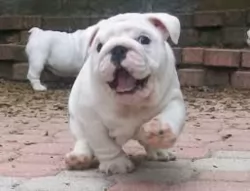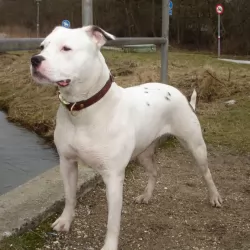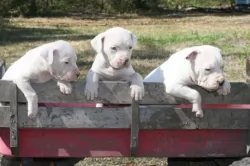 MyDogBreeds
MyDogBreeds German Coolie is originated from Australia but Antebellum Bulldog is originated from United States. German Coolie may grow 6 cm / 2 inches shorter than Antebellum Bulldog. German Coolie may weigh 44 kg / 97 pounds lesser than Antebellum Bulldog. German Coolie may live 3 years more than Antebellum Bulldog. Both German Coolie and Antebellum Bulldog has almost same litter size. Both German Coolie and Antebellum Bulldog requires Low maintenance.
German Coolie is originated from Australia but Antebellum Bulldog is originated from United States. German Coolie may grow 6 cm / 2 inches shorter than Antebellum Bulldog. German Coolie may weigh 44 kg / 97 pounds lesser than Antebellum Bulldog. German Coolie may live 3 years more than Antebellum Bulldog. Both German Coolie and Antebellum Bulldog has almost same litter size. Both German Coolie and Antebellum Bulldog requires Low maintenance.
 The German Coolie is misnamed as it is an Australian bred dog and often called the Australian Koolie or Coolie. This Australian breed is more often just called a Coolie. The breed is a typical herding breed and a working dog that needs a job all the time. They have been a favorite of Australians since the late 1800’s when local dogs were bred with British working dogs.
The German Coolie is misnamed as it is an Australian bred dog and often called the Australian Koolie or Coolie. This Australian breed is more often just called a Coolie. The breed is a typical herding breed and a working dog that needs a job all the time. They have been a favorite of Australians since the late 1800’s when local dogs were bred with British working dogs.
Although all Coolie’s are not the same. Within the breed there is a lot of variation. This is because the Coolie was bred individually for different regions in Australia. In a very different writing the Koolie Club of Australia does not define the Coolie breed on confirmation as all other purebred dogs are defined. Instead the Coolie is defined by ability to work. In light of this most Coolie breeders state that the Coolie is a breed and the variations you see among regions are types within the breed.
As a herding dog, the Coolie brought a lot of skill to the Australian farmers and sheep herders. The Coolie will round up the sheep and bring them back to their enclosure at the shepherd’s command. They are upright, silent, working dogs. Not only do they herd sheep they are important at sheering to “cut out” the sheep or assist in the close quarters of lambing.
In Queensland North and New South Wales, the Coolie is medium boned, tall and agile ready to herd cattle over a long stretch of miles. In the Snowy Mountains of New South Wales and the Hunter Valley Region, the Coolie is shorter and thicker in order to be able to get cattle that are lying low out from the gullies and dense bush. The Coolies found in Victoria are the smallest of all.
No matter where they live and work, the Coolie is bred to help the workers there, the farmers, the stockman, and the grazier. All Coolies are adaptable and very agile. They all have a strong willfulness to accomplish what they are asked to do. The ancestors of these various Coolie was the British Collie – a smooth coated, blue merle. This Collie was crossed with the Black and Tan Collie from the Scottish Highlands. It is believed that these are the same Collie breeds that came to Australia to create the Heeler.
The name may come from the German immigrants working in South Australia and unable to pronounce Collie incorrectly they called the dogs German Coolies. There is also a fraction of German breeders who believe that the German Tiger dog was brought to Australia in the 18th century and then when the Collies came they were bred together. Many Coolie breeders have records showing that the breed has been in Australia for at least 160 years. It is also believed that the Border Collie and Kelpie (Blue Heeler) were mixed into the breed at sometime as well.
No bench standard exists for the German Coolie even though there is the Koolie Club of Australia. The mission of the club is to protect, preserve and promote the breed. The Australian Sporting Register was recognizing the Coolies in 2004. They are eligible to participate in the Australian National Kennel Council sanctioned sporting trials. They participate in Queensland, New South Wales and Victoria through the individual states sporting register. Here they participate in herding, jumping, obedience, agility and tracking.
Several other recognitions as a herding breed soon followed. The Australian Shepherd Club of America, the American Herding Breed Association, were followed by recognition from others as well. They are not recognized by the American Kennel Club (AKC).
 The history of the Antebellum Bulldog dates back the 1600s where it was used as a lasting solution to drive away hogs in rice plantation farms in Altamaha River in Georgia. After the plantation system became dominant in most parts of the United States, a majority of the farmers had to think of a more creative way of driving away wild feral pigs and cattle. Having caused multiple deaths to humans due to their massive bodies and extremely sharp horns, farm owners had no option but to employ bulldogs as the only means of security.
The history of the Antebellum Bulldog dates back the 1600s where it was used as a lasting solution to drive away hogs in rice plantation farms in Altamaha River in Georgia. After the plantation system became dominant in most parts of the United States, a majority of the farmers had to think of a more creative way of driving away wild feral pigs and cattle. Having caused multiple deaths to humans due to their massive bodies and extremely sharp horns, farm owners had no option but to employ bulldogs as the only means of security.
Although these dogs served their purpose of protecting their masters while still being family companions, their age of extinction came during the Civil War where the economy at the Altamaha region was permanently altered. After the fall of plantation farming and abolition of slavery, the Antebellum Bulldog became a forgotten breed something which led to its extinction. However, as years passed by, this rare breed was eventually reintroduced by the Maxwell family under strict guidelines by the Animal Research Foundation.
 With their strong ancestry among the family of collies and herders, the German Coolie shares the look of collies and shepherds. Even though they differ from region to region and there is no actual standard, they are medium sized dogs with blue or brown eyes or even one of each. The ears are folded over on top when relaxed but they are rigid and straight when he is more alert. The nose is either chocolate or red depending on the color of their coat.
With their strong ancestry among the family of collies and herders, the German Coolie shares the look of collies and shepherds. Even though they differ from region to region and there is no actual standard, they are medium sized dogs with blue or brown eyes or even one of each. The ears are folded over on top when relaxed but they are rigid and straight when he is more alert. The nose is either chocolate or red depending on the color of their coat.
They can have either a long, medium or short coat but most owners want the short coat that is smooth as well. The coat can be one color – red/chocolate or black; Bi – red/white or black/white; Tri – solid black or red with white and brown; Tri merle -merle with white and brown; Merle – red merles and blue merles. Regardless of color, the German Coolie has the look of a collie or German Shepherd.
 The Antebellum Bulldog is a recently introduced breed that was developed with an aim of recreating the historic working bulldog or Southern breed. First introduced in the United States, this bulldog was initially bred to be used as a working dog in rice plantations in Altamaha River Valley, a region in South East Georgia.
The Antebellum Bulldog is a recently introduced breed that was developed with an aim of recreating the historic working bulldog or Southern breed. First introduced in the United States, this bulldog was initially bred to be used as a working dog in rice plantations in Altamaha River Valley, a region in South East Georgia.
By nature, the Antebellum Bulldog is an extremely loving, loyal, affectionate, and very intelligent pet. Due to that reason, this breed is a perfect choice for a family dog. If we can get back to history, it’s evident that this dog breed was used in plantation farms to secure the rice from damages caused by cattle and wild hogs. Relating these tasks to the dog’s overall personality, you will find that indeed the Antebellum Bulldog is one such breed that can be trusted as a watchdog in today’s homes.
The Antebellum Bulldog is very similar to the American Bulldog only that it’s a little bit larger and bulkier with a proportionally bigger head. These breeds usually range from bigger to biggest with males weighing around 36 to 68 Kg (80—150 pounds) and females 32 to 50 Kg (70—110 pounds). Similar to the American Bulldog, the Antebellum Bulldog has a rough coat, long legs, an athletic body and short tail/ears that don’t require any cropping.
Despite of their intimidating appearance, the Antebellum Bulldog is an extremely loving, passionate, and loyal pet that will suit perfectly as a family dog. These dogs will lie down to their masters and will need nothing more than constant company. According to professional breeders, the Antebellum Bulldog is most likely to form a close attachment to one member of the family although they still do enjoy hanging out with the rest of the family members.
As it is the case with most American Bulldogs, the Antebellum Bulldog has a very strong protective instinct that makes it react violently when strangers step into its territories. Something else you need to know about this Bulldog breed is that it does get along well with kids to a point of being overprotective. Since puppies are usually over playful, adults are highly advised to watch out as they can accidentally bowl or knock over your toddler.
The Antebellum Bulldog doesn’t have to be professionally groomed as is the case with most dog breeds. Apart from a weekly brushing of the coat, the other grooming needs you’re supposed to observe include; regular brushing of the teeth and trimming of nails from an early stage.
 Yes, they can be very friendly with children is they are socialized and supervised.
Yes, they can be very friendly with children is they are socialized and supervised.
They have enough stamina to work for 14 hours a day.
They are very adaptable. They can be calm and steady when working a mother and baby lamb and then be able to forcefully move steers, bull, rams or weathers.
The breed is highly intelligent, and their learning ability is excellent because they want to please you.
 Although the Antebellum Bulldog is quite intimidating, this dog can make a great pet thanks to its loving, patient, and extremely tolerant characteristics. This dog enjoys playing with young children as well as other members of the family although proper care should be observed to avoid injuring young toddlers due to their muscular bodies.
Although the Antebellum Bulldog is quite intimidating, this dog can make a great pet thanks to its loving, patient, and extremely tolerant characteristics. This dog enjoys playing with young children as well as other members of the family although proper care should be observed to avoid injuring young toddlers due to their muscular bodies.
The Antebellum Bulldog is a protective dog breed with very strong guarding instincts. New visitors will have to be very careful as these dog breeds are quite wary of strangers and will not treat them politely. However, if you become familiar with them, they are likely to know you and later accept you as part of a large family.
Speaking of adaptability, the Antebellum Bulldog is more of a working dog than a household pet. Although some people will prefer to keep them indoors, always ensure that your homestead has a backyard where they can exercise. Otherwise, these dog breed will prefer to be kept in rural areas where there are vast tracks of land for them to play on.
Finally, the Antebellum Bulldog is an intelligent dog with a very sharp memory. However, due to their extremely playful nature, they can become very stubborn and messy. Therefore, owners are advised to train them early enough before they are fully grown.
 This is a relatively healthy breed without many genetic disorders found in purebreds due to the 160 years they have spent fairly isolated and allowing natural selection to take its course.
This is a relatively healthy breed without many genetic disorders found in purebreds due to the 160 years they have spent fairly isolated and allowing natural selection to take its course.
In Merle dogs there can be deafness and/or blindness. If you breed a solid to a merle you can eliminate that.
These are not inherited but rather acquired due to the immense amount of jumping and running.
Rare but it does occur and can be fatal if not treated
 The Antebellum Bulldog has a life expectancy of 12—15 years. Recognized as an emerging breed, this dog doesn’t have many health problems as compared to most other dog breeds. Although these dogs are muscular and very athletic, these breeds suffer from various health conditions which are caused by the nature of their coat. Among the common health problems of the Antebellum Bulldog include
The Antebellum Bulldog has a life expectancy of 12—15 years. Recognized as an emerging breed, this dog doesn’t have many health problems as compared to most other dog breeds. Although these dogs are muscular and very athletic, these breeds suffer from various health conditions which are caused by the nature of their coat. Among the common health problems of the Antebellum Bulldog include
One major health problem that affects blue-eyed dog breeds (such as this one) is possible blindness. This condition is usually caused by diabetes, hypertension or Cushing’s syndrome. To treat this condition, you need to take your dog for regular veterinary checkups to know the root cause of the problem.
Another health problem that is very familiar with most Antebellum Bulldogs is hip dysplasia. Since these dog breeds are usually muscular and very huge, this condition is most likely to affect them, especially at an early stage. Dog owners should, therefore, be very familiar with this condition and should take their pets for regular veterinary tests to avoid it.
 Break meals into 3 a day feeding a high quality dry puppy food designed for dogs of his size. 11/2 to 2 cups per day.
Break meals into 3 a day feeding a high quality dry puppy food designed for dogs of his size. 11/2 to 2 cups per day.
Break meals into 2 a day feeding a high quality dry adult food designed for dogs of his size.
Traditionally good health. Great energy, intensity and devotion to work and owner.
This is an energetic dog that loves to work and needs to work. Regular routine exercise is needed daily. He needs to be stimulated mentally and physically. Find him a job. Make sure he knows what you want him to do. They work well with a human partner in games such as agility, tracking, flyball and herding. They need a large yard and a lot of play time. They are not couch potatoes and would be unhappy if they were stuck in a house or apartment
 Feeding an Antebellum Bulldog is much similar to feeding other dogs. Owners are highly advised to stick to high-quality hypoallergenic diets that are rich in vitamins and nutrients. Now, since Antebellum Bulldog puppies are usually playful, feeding them with high nutrient food thrice a day will really help. Always avoid feeding your puppies with processed foods or foods with artificial sugars as they can expose the puppies to severe health problems.
Feeding an Antebellum Bulldog is much similar to feeding other dogs. Owners are highly advised to stick to high-quality hypoallergenic diets that are rich in vitamins and nutrients. Now, since Antebellum Bulldog puppies are usually playful, feeding them with high nutrient food thrice a day will really help. Always avoid feeding your puppies with processed foods or foods with artificial sugars as they can expose the puppies to severe health problems.
When feeding senior Antebellum Bulldog, there are some small changes you’ll need to make. First, these dogs will require high-quality foods that are easy to digest. Wet foods are perfect for Antebellum Bulldogs as they will help to keep them hydrated. Buy dog foods low in calories and rich in essential vitamins and nutrients to match your dog’s energy.
Antebellum Bulldog can add extra weight if proper care is not observed when feeding them. Due to this reason, these dogs should be fed depending on their level of activity to avoid cases of obesity.
Since their ancestors were used to guard rice plantations in Altamaha, Antebellum Bulldogs are very energetic and highly suited in rural settings over indoor lifestyle. However, if you decide to keep these dogs as pets in your households, it’s advisable that you provide them with some playing space in the backyard.
When it comes to training the Antebellum Bulldog, owners are advised to train them to be obedient at an early stage as they can get really stubborn in the future. These dogs are very intelligent and they never forget what they learn once they’ve mastered it.